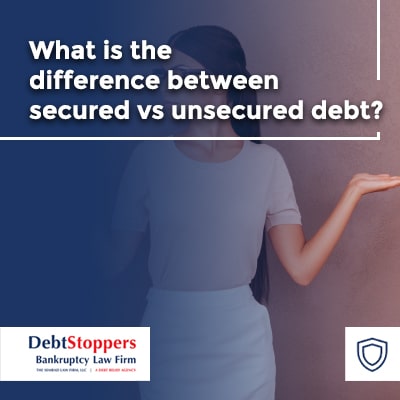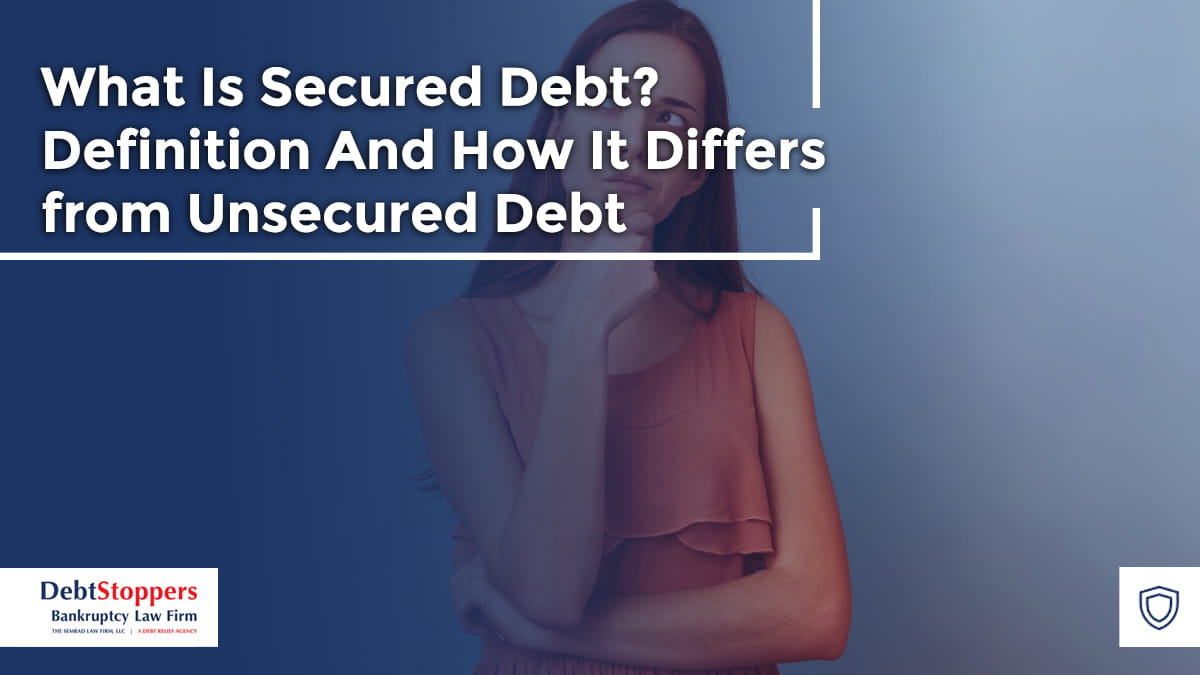If you are considering taking out new debt or struggling to manage your existing debt, you may be wondering what the difference is between secured and unsecured debt. Knowing the difference between secured and unsecured debt can help you protect your assets and your family if you are short on cash.
Simply put, secured debt refers to the money owed on a loan that is backed by collateral. The loan for secured debt includes tangible property that the lender can take possession of if the loan isn’t repaid.
The most important thing to know is that if you do not make payments on secured debt, you can lose the asset that was pledged as collateral. For example, if you don’t make your car payments, the lender can repossess the car.
For most people, losing their home or car would be disastrous, and knowing the definition of secured debt can help them make informed decisions about managing existing debt or taking on new debt.

What is the difference between secured vs unsecured debt?
The primary difference between secured and unsecured debt is that secured debt is backed by collateral, and unsecured debt is not. Examples of secured debt include mortgages and auto loans. Examples of unsecured debt include credit cards, medical bills, payday loans, and most personal loans.
Since secured debt provides a level of protection or security for a lender, these loans typically come with more beneficial terms for the borrower, including longer repayment periods, lower interest rates, and higher borrowing limits. For example, a home loan is typically for 30 years and offered at a lower interest rate than other loans. Lenders are willing to give these terms for mortgages, in large part, because the value of the real estate ensures they will not lose their money even if the borrower fails to repay the loan.
If the borrower does not pay their mortgage payments, the lender will initiate the foreclosure process and take possession of the real estate.
Unsecured debt, on the other hand, comes at a greater risk to the lender and typically comes with less favorable terms, including higher interest rates or shorter repayment periods. Unsecured loans typically are for lower amounts since they are not backed by collateral.
How does collateral relate to secured debt?
Collateral is the key aspect of secured debt. Collateral is the tangible asset that is pledged to back the loan. If the borrower does not repay the loan, the collateral can be recouped by the lender. Common examples of collateral include real estate for mortgage loans and a vehicle for a car loan.
What is secured debt in mortgages, auto loans, and credit?
Common types of secured debt include mortgages and auto loans. However, it is also possible to get a secured credit card, which operates differently from other credit cards.
Mortgages are among the most common types of secured debt. This is true for many reasons. Most people cannot afford to purchase real estate outright, meaning they would have to pay for the entire house at purchase time. To afford a home purchase, most people take out a mortgage. Mortgages often come with fixed terms for 15-30 years. Mortgages are also typically for larger amounts of money, ranging from hundreds of thousands to millions of dollars. The more generous terms allow people access to homeownership that would otherwise not be possible. However, it’s important to understand that failing to pay your mortgage can result in losing the house through the foreclosure process.
Auto loans are very similar to home loans or mortgages. Auto loans typically have shorter terms, often 3-5 years, and are for less money than mortgages, but the principal is the same. If you do not make your monthly car payment, you are at risk of losing the vehicle through repossession. When a vehicle is repossessed, it is typically sold at auction to recoup the lender’s money. If the sale of the vehicle does not cover the remaining loan balance, you can be held responsible for the deficiency balance, meaning you would have to pay for a car you no longer have.
Credit cards on the other hand, work a little differently. Typically, credit cards are considered unsecured debt and come with higher interest rates and shorter repayment terms. However, it is possible to get a secured credit card. Secured credit cards require a cash deposit to secure the loan. People sometimes utilize secured credit cards when they need to rebuild or repair their credit.
How can you identify secured debt in your finances?
You can identify secured debt in your finances by determining if any of your loans are backed by collateral. If you are not sure, you can also check your loan agreement, which should state whether collateral was pledged. For example, if you have a mortgage or car payment, you likely have secured debt.
What are the advantages of secured debt for lenders and borrowers?
For lenders, the advantage of secured debt is the lower level of risk. Simply put, the collateral backing secured debt provides the borrower with a higher level of protection from loss if the borrower fails to repay the debt.
For borrowers, the advantages of secured debt are lower interest rates, longer repayment terms, and higher borrowing limits. Simply put, secured loans help people make big purchases like homes and cars.

What happens if you default on secured debt?
If you default on secured debt, you risk losing the collateral that was pledged. If you miss your monthly car payment, the lender will likely repossess the car and sell it at auction.
If you default on your mortgage, you risk losing your home through foreclosure. Simply put, if you do not make your monthly payments for secured debt, you can lose the asset, which is commonly your house or car. For most people, either of these events would be devastating, so it’s important to understand how secured debt works and what happens if you default on secured debt.
How does secured vs unsecured debt affect credit scores?
Secured and unsecured debt both impact your credit in similar ways. If you make your monthly payments on time with both secured and unsecured debt, your credit score will increase as you demonstrate your creditworthiness. However, if you miss payments or make late payments on both secured and unsecured debt, your credit score will be negatively impacted.
Both types of debt will contribute to your overall credit utilization, but since secured loans are typically for higher amounts, they can have a disproportionate impact on your overall credit utilization.





